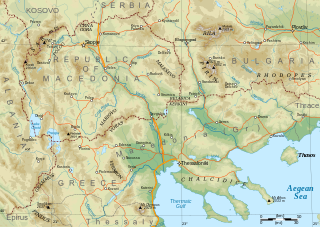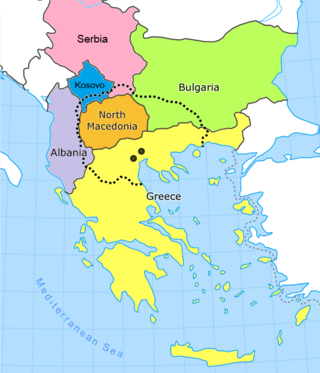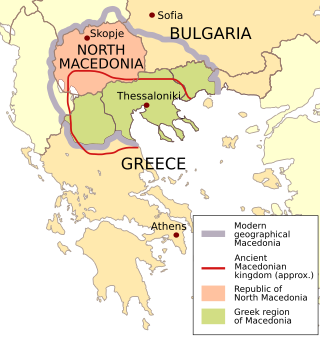The following is a list of radio stations in North Macedonia.
The following is a list of radio stations in North Macedonia.
| Name |
|---|
| Antenna 5 |
| Kanal 77 |
| Makedonsko Radio 1 |
| Makedonsko Radio 2 |
| Makedonsko Radio 3 |
| Metropolis Radio |
| Place | Name | Frequency (MHz) |
|---|---|---|
| Berovo | Radio Sky | 101,0 |
| Bitola | Radio 105 Aktuel Bombarder | 105,0 |
| Radio 106 | 106,6 | |
| Radio B-97 | 94,4 | |
| Radio Bitola | 89,8 95,8 | |
| Radio Delfin | 105,0 | |
| Centar Župa | Radio Semi | 103,0 |
| Debar | Radio Marilyn | 104,7 |
| Delčevo | Radio Tigar | 93,8 |
| Dolneni | Radio Besa | 107,6 |
| Radio Rinia 2000 | 107,2 | |
| Gevgelija | Radio Time FM | 100.8 |
| Gostivar | Pro FM | 89,3 |
| Radio Kometa | 106,4 | |
| Kavadarci | Radio Galaxy | 102,2 |
| Radio Hot FM | 99,1 | |
| Radio Kavadarci | 99,1 | |
| Kičevo | Radio Akord | 96,5 |
| Radio Aleksandar Makedonski | 106,0 | |
| Radio Kale | 100,0 | |
| Kočani | Radio Rosa | 98,1 99,5 |
| Radio Pik | 98,9 | |
| Kumanovo | City FM | 97,9 |
| Radio Albana Kumanovë | 99,3 | |
| Radio Bravo | 88,5 | |
| Radio Jehona | 103,5 | |
| Radio KMR | 104,2 | |
| Radio Viva | 95,0 | |
| Makedonski Brod | Radio Moris | 100,2 |
| Mavrovo and Rostuša | Radio Emi | 93,7 |
| Radio Mis | 103,5 | |
| Negotino | Energy Radio | 91,7 |
| Negotino | Radio Miks | 100,5 |
| Ohrid | MX Radio | 101,2 |
| Radio Lav | 91,5 | |
| Radio Ohrid | 89,0 | |
| Super Radio | 97,0 | |
| Pehčevo | Radio Pehčevo | 100,0 |
| Plasnica | Radio Mis | 103,0 |
| Prilep | Radio 5 Čoki | 89,5 |
| Prilep | Radio Holiday | 102,1 |
| Radio Meff | 98,7 | |
| Radio Ternipe | 90,3 | |
| Radoviš | Alfa Radio | 98,3 |
| Skopje | Radio HIT | Internet Radio |
| Club FM | 103,4 | |
| Star Radio (Urban Folk) | Internet Radio | |
| Jazz FM | 100,8 | |
| Kanal 103 | 103,0 | |
| Life Radio | 89,1 | |
| Star Radio | Internet | |
| Radio Bubamara | 105,2 | |
| Radio Classic FM | 90,8 | |
| Radio Fortuna | 96,8 | |
| Radio Haracina | 99,9 | |
| Radio Ravel | 96,0 | |
| Radio Vati | 88,4 | |
| Sky Radio | 102,5 | |
| Sportsko radio | 90,3 | |
| Sportsko Radio Kanal 4 | 107,4 | |
| Zona M1 Radio | 104,4 | |
| Struga | Radio Drini | 101,6 |
| Radio 102KA | 102,2 | |
| Radio Rrapi | 107,5 | |
| Play Radio | 90,4 | |
| Strumica | Ekspres Radio | 101,1 |
| Hit Radio | 88,1 | |
| Sveti Nikole | Radio Sveti Nikole | 87,8 |
Radio Modea | 97,7 | |
| Štip | Radio Čerenja | 106,4 |
| Radio Štip | 98,6 99,2 | |
| Tetovo | Radio Bleta | 101,0 |
| Radio Fama Tetovë | 97,5 | |
| Radio Focus Tetovë | 98,0 | |
| Radio Kiss | 104,7 | |
| Radio PlusForte | 102,3 | |
| Radio Tetovo | 93,5 | |
| Radio Visari | 103,6 | |
| Veles | 5 FM | 107,1 |
| CBM Radio | 96,2 | |
| CD Radio | 96,7 | |
| Radio Goldi | 103,0 | |
| Vinica | Radio La Kosta | 103,3 |

Alexander III of Macedon, most commonly known as Alexander the Great, was a king of the ancient Greek kingdom of Macedon. He succeeded his father Philip II to the throne in 336 BC at the age of 20 and spent most of his ruling years conducting a lengthy military campaign throughout Western Asia, Central Asia, parts of South Asia, and Egypt. By the age of 30, he had created one of the largest empires in history, stretching from Greece to northwestern India. He was undefeated in battle and is widely considered to be one of history's greatest and most successful military commanders.
Macedonian is an Eastern South Slavic language. It is part of the Indo-European language family, and is one of the Slavic languages, which are part of a larger Balto-Slavic branch. Spoken as a first language by around 1.6 million people, it serves as the official language of North Macedonia. Most speakers can be found in the country and its diaspora, with a smaller number of speakers throughout the transnational region of Macedonia. Macedonian is also a recognized minority language in parts of Albania, Bosnia and Herzegovina, Romania, and Serbia and it is spoken by expatriate communities predominantly in Australia, Canada, and the United States.

Macedonia is a geographical and historical region of the Balkan Peninsula in Southeast Europe. Its boundaries have changed considerably over time; however, it came to be defined as the modern geographical region by the mid-19th century. Today the region is considered to include parts of six Balkan countries: all of North Macedonia, large parts of Greece and Bulgaria, and smaller parts of Albania, Serbia, and Kosovo. It covers approximately 67,000 square kilometres (25,869 sq mi) and has a population of around five million. Greek Macedonia comprises about half of Macedonia's area and population.
The history of North Macedonia encompasses the history of the territory of the modern state of North Macedonia.

Skopje is the capital and largest city of North Macedonia. It is the country's political, cultural, economic, and academic centre. Skopje lies in the Skopje Basin.

Macedonia, also called Macedon, was an ancient kingdom on the periphery of Archaic and Classical Greece, which later became the dominant state of Hellenistic Greece. The kingdom was founded and initially ruled by the royal Argead dynasty, which was followed by the Antipatrid and Antigonid dynasties. Home to the ancient Macedonians, the earliest kingdom was centered on the northeastern part of the Greek peninsula, and bordered by Epirus to the southwest, Illyria to the northwest, Paeonia to the north, Thrace to the east and Thessaly to the south.

Philip II of Macedon was the king (basileus) of the ancient kingdom of Macedonia from 359 BC until his death in 336 BC. He was a member of the Argead dynasty, founders of the ancient kingdom, and the father of Alexander the Great.

Macedonians are a nation and a South Slavic ethnic group native to the region of Macedonia in Southeast Europe. They speak Macedonian, a South Slavic language. The large majority of Macedonians identify as Eastern Orthodox Christians, who share a cultural and historical "Orthodox Byzantine–Slavic heritage" with their neighbours. About two-thirds of all ethnic Macedonians live in North Macedonia; there are also communities in a number of other countries.

Central Macedonia is one of the thirteen administrative regions of Greece, consisting the central part of the geographical and historical region of Macedonia. With a population of almost 1.8 million, it is the second most populous region in Greece after Attica.

The Internal Macedonian Revolutionary Organization, was a secret revolutionary society founded in the Ottoman territories in Europe, that operated in the late 19th and early 20th centuries.

The North Macedonia national football team represents North Macedonia in men's international football, and is administered by the Football Federation of Macedonia. The team play their home matches at the Toše Proeski National Arena in Skopje.

Macedonia, most commonly refers to:

The Socialist Republic of Macedonia, or SR Macedonia, commonly referred to as Socialist Macedonia, Yugoslav Macedonia or simply Macedonia, was one of the six constituent republics of the post-World War II Socialist Federal Republic of Yugoslavia, and a nation state of the Macedonians. After the transition of the political system to parliamentary democracy in 1990, the Republic changed its official name to Republic of Macedonia in 1991, and with the beginning of the breakup of Yugoslavia, it declared itself an independent country and held a referendum on 8 September 1991 on which a sovereign and independent state of Macedonia, with a right to enter into any alliance with sovereign states of Yugoslavia was approved.

The Football Federation of Macedonia – FFM or Football Federation of North Macedonia is the governing body of football in North Macedonia, based in Skopje.

The Macedonians were an ancient tribe that lived on the alluvial plain around the rivers Haliacmon and lower Axios in the northeastern part of mainland Greece. Essentially an ancient Greek people, they gradually expanded from their homeland along the Haliacmon valley on the northern edge of the Greek world, absorbing or driving out neighbouring non-Greek tribes, primarily Thracian and Illyrian. They spoke Ancient Macedonian, which is usually classified by scholars as a dialect of Northwest Doric Greek, and occasionally as a distinct sister language of Greek or an Aeolic Greek dialect. However, the prestige language of the region during the Classical era was Attic Greek, replaced by Koine Greek during the Hellenistic era. Their religious beliefs mirrored those of other Greeks, following the main deities of the Greek pantheon, although the Macedonians continued Archaic burial practices that had ceased in other parts of Greece after the 6th century BC. Aside from the monarchy, the core of Macedonian society was its nobility. Similar to the aristocracy of neighboring Thessaly, their wealth was largely built on herding horses and cattle.

Macedonia is a geographic and former administrative region of Greece, in the southern Balkans. Macedonia is the largest and second-most-populous geographic region in Greece, with a population of 2.36 million. It is highly mountainous, with major urban centres such as Thessaloniki and Kavala being concentrated on its southern coastline. Together with Thrace, along with Thessaly and Epirus occasionally, it is part of Northern Greece. Greek Macedonia encompasses entirely the southern part of the wider region of Macedonia, making up 51% of the total area of that region. Additionally, it widely constitutes Greece's borders with three countries: Albania to the northwest, North Macedonia to the north, and Bulgaria to the northeast.

The use of the country name "Macedonia" was disputed between Greece and the Republic of Macedonia between 1991 and 2019. The dispute was a source of instability in the Western Balkans for 25 years. It was resolved through negotiations between the two countries, mediated by the United Nations, resulting in the Prespa Agreement, which was signed on 17 June 2018. Pertinent to its background is an early 20th-century multifaceted dispute and armed conflict that formed part of the background to the Balkan Wars. The specific naming dispute, although an existing issue in Yugoslav–Greek relations since World War II, was reignited after the breakup of Yugoslavia and the newly-gained independence of the former Socialist Republic of Macedonia in 1991. Since then, it was an ongoing issue in bilateral and international relations until it was settled with the Prespa agreement in June 2018, the subsequent ratification by the Macedonian and Greek parliaments in late 2018 and early 2019 respectively, and the official renaming of Macedonia to North Macedonia in February 2019.

Macedonian Americans are Americans of ethnic Macedonian heritage.

North Macedonia, officially the Republic of North Macedonia, is a landlocked country in Southeast Europe. It shares land borders with Greece to the south, Albania to the west, Bulgaria to the east, Kosovo to the northwest and Serbia to the north. It constitutes approximately the northern third of the larger geographical region of Macedonia. Skopje, the capital and largest city, is home to a quarter of the country's population of 1.83 million. The majority of the residents are ethnic Macedonians, a South Slavic people. Albanians form a significant minority at around 25%, followed by Turks, Roma, Serbs, Bosniaks, Aromanians and a few other minorities.

The Argead dynasty, also known as the Temenid dynasty was an ancient Macedonian royal house of Dorian Greek provenance. They were the founders and the ruling dynasty of the kingdom of Macedon from about 700 to 310 BC.